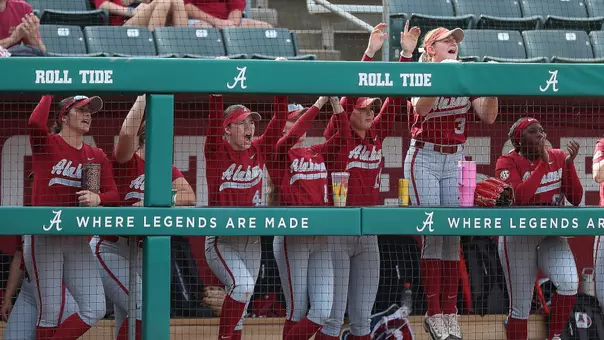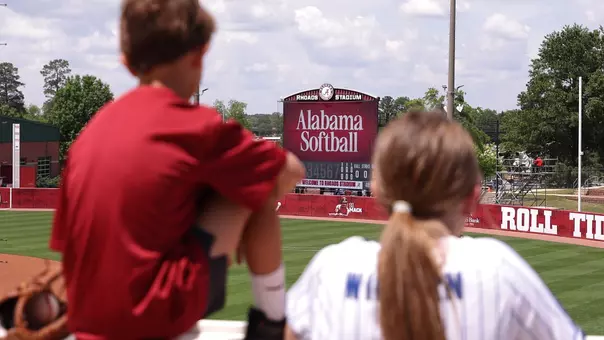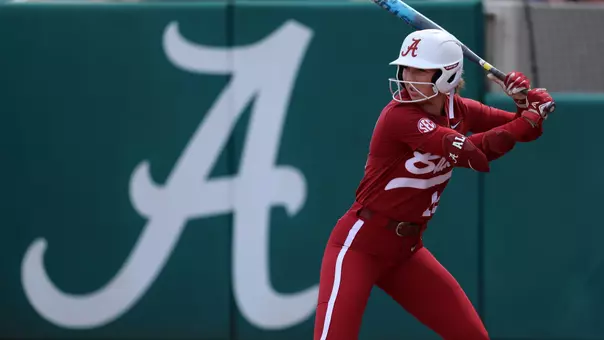All-American Flashback: Ginger Jones (1998-2001)
11/1/2015 12:00:00 AM | Softball
In honor of Alabama softball's 20th anniversary, RollTide.com will be catching up with our 20 former All-Americans in a series of features. Our fourth feature is on Ginger Jones (1998-2001), a left-handed power hitter whose 2000 All-American season remains one of the best in program history.
Alabama was fortunate to find its fourth All-American, Ginger Jones, right in its own backyard of Northport, Ala. Despite their proximity to Tuscaloosa, the Jones' family allegiance lay elsewhere when Jones, now Ginger Sillery, was introduced to fastpitch softball in high school.
"I didn't start playing fastpitch until I was probably 15 years old," Sillery said. "Once I started playing the game, I got hooked and knew I wanted to play at the next level. To be honest, before I went to Alabama - my dad was a big Auburn football fan so I was thinking of going there, even though they didn't have softball."
Sillery knew that college softball was a goal and her introduction to Alabama's program came largely out of the convenience of the campus and the desire to play for a better club team in Birmingham.
"College softball was always a dream of mine and it was an amazing opportunity when it happened," Sillery said. "I was looking to play with a more competitive team in Birmingham so I wanted to see how good I was. I signed up for an Alabama softball camp and that's where I met Coach [Pat] Murphy and they noticed me after that."
The current college recruiting strategy focuses on bigger facilities and seemingly infinite uniform combinations, but the difference for Sillery in deciding on Alabama was a matter of simple courtesy and communication.
"I knew around my sophomore year that Alabama was going to create a program and I committed my junior year," Sillery said. "Patrick Murphy is an amazing recruiter. Immediately after I went to the softball camp, they sent me a postcard in the mail saying how impressed they were with my performance at the camp and they wanted to see me play more. They're wonderful communicators and positive influences. They showed interest in me from the beginning and they made me feel special and important. It just felt right when I met the team and heard about the possible new facilities coming down the road. They promised that we'd make the World Series before I graduated and I believed them.
"I got interest from other Division-I schools after I committed to Alabama that had nicer facilities and whatnot but I felt, in my heart, Alabama was where I was supposed to go. I wanted to go into marine biology and Alabama had a good program so that was another plus for me. It was a pretty easy decision and I wanted to make that decision early. I didn't want to be stressed about where I was going to college during my senior year of high school. Everything just fell together perfectly."
Playing locally through her high school years, Sillery was very familiar with the Tide's temporary homes in Bowers Park and Sokol Park. Regardless of whether it was a high school team, The University of Alabama, or a local rec team, the challenges remained the same.
"There were huge holes in the outfield," Sillery said. "We had to help with the upkeep of the field along with our managers. I always felt bad for our outfielders having to catch a ball going over the fence because I knew that they'd knock the plastic fence over and fall on it. We always had to go around and check for ants and clean the dugouts from the rec league game the night before. They were hard at the time but they were some great memories knowing what we ended up with. It was worth the wait to see the magic of that first night in the new stadium."
The first game at the Alabama Softball Complex, now known as Rhoads Stadium, was on Feb. 23, 2000, which was Sillery's junior year at Alabama. Alabama defeated UAB, 7-1, in front of over 1,500 fans.
"It was amazing," Sillery said of that opening game. "I think it brought tears to all of our eyes. They had a big stage in center field we all walked onto and they had a big fireworks show. The stadium was packed with people and it was just an amazing night.
"Facilities play a huge part in program success. The fans fire you up with a stadium full of people. It gives you those nervous butterflies and a positive pressure to perform well for them and my team. The whole atmosphere changes everything, even just having nicer grass and nicer dirt. I grew up playing in Bowers and Sokol Park so that wasn't as special to me as playing at our stadium. It was special knowing that this was our home and that no one else plays here but Alabama softball."
The full stadium was the reward for countless hours of community outreach the team put in over its first three years as a program.
"We did a lot of things in the community like going to schools and talking to the kids," Sillery said. "We wanted to let people know who we were as people, not just players. We wanted to tell people about what we were striving to be and the kind of program that we were building.
"Growing up in Alabama, the fans are always there. They're super supportive with any sport and their allegiance to the school. I wasn't surprised with the fan turnout because I believed it when the coaches told us it would happen. It was always a dream of ours but we could see the writing on the wall that it was coming. The coaches kept preaching that dream and we bought into it."
Sillery, along with Kelly Kretschman and Shelley Laird, were named All-Americans in 2000, matching the Tide's total All-America honors from its first three seasons. That season, Sillery led the team with 17 home runs and 69 RBI. Her RBI total remained an Alabama single-season record until Charlotte Morgan earned 79 in 2008.
"I had a lack of experience with high-level fastpitch coming in," Sillery Said. "It took me a couple years of just working my tail off to get to the level I needed to be an All-American. Because Kelly [Kretschman] and I were both left-handed power hitters, we fed off of each other. Murphy knew that we were good partners for hitting and that we'd make each other better because we were both very competitive. We had a similar mentality at the plate. She definitely made me a better player just by watching her swing. She has a natural gift and mine came with a lot more hard work.
"Those were my favorite days at practice when Murphy was throwing to us and Kelly and I were battling it out against each other. Those are my favorite memories. On some teams, there is negativity that comes from competition but not on our team. That's what made us jump to that level."
Some of Sillery's other favorite memories came in the offseason and even in the pregame ceremonies.
"I always loved our teambuilding activities in the fall," Sillery said. "Coach Murphy would invite teambuilding coaches to come in and we'd spend a week in the fall getting closer to each other and getting to know everyone on a more personal level off the field. We'd have Halloween dress-ups and team parties and things like that. I always loved spending time with the kids after the games and signing autographs. I really miss all of those things.
"One of my favorite times before the game was on the field during the national anthem. When I come back to watch the games now, I almost get teary-eyed hearing the anthem from the stands because I want to be on the field looking at the fans and I really miss that excitement and nervous energy before the game."
Lessons of perseverance and mental toughness have followed Sillery from her time at Alabama into her life after graduation. One moment in particular surrounding the team's 2000 series at Auburn stood out among the rest.
"I was an All-American but I was also an Academic All-American, so I was always a perfectionist in everything I did," Sillery said. "There was a big weekend we were playing Auburn and I had three exams that I was going to have to take right before we left since I would have missed the classes traveling. I told Murphy that I didn't think I could do it and I might have to stay back from the trip. He told me 'I'm going to let you make the decision, but you've been doing a great job so far and I know you can do it and you can do well.' I thought about it and took the exams before I left, did better than I thought I would, and then ended up having one of my best weekends playing Auburn and was SEC Player of the Week. It all worked out well because I made the decision to toughen up instead of cower back. He coached me through it and let me make the decision. His positive reinforcement about my character and work ethic made me believe I could do it."
Sillery and her husband, John, currently live in Chattanooga, Tenn., with their four-year-old daughter, Sage.
"John in an ER physician and I'm currently doing private softball lessons and personal training, but I'm mainly focusing on being a mom now," Sillery said. "Prior to having my daughter I was a high school biology teacher. The two things I never thought I'd be when I graduated college were a teacher and a coach and I've done both of them. I'm going to be a coach of a local high school team in the spring. I always try to stay around the game because it's been so good to me and opened so many doors and given me the chance to travel and perform at so many levels."
After growing up in an Auburn household, her family has firmly switched allegiances to the Crimson Tide, and that definitely includes Sage as well.
"My parents and I are season ticket holders, so we go as often as we can but not as often as I'd like," Sillery said. "Sage has been to at least one or two softball games every year of her life so she knows all about Alabama softball."








